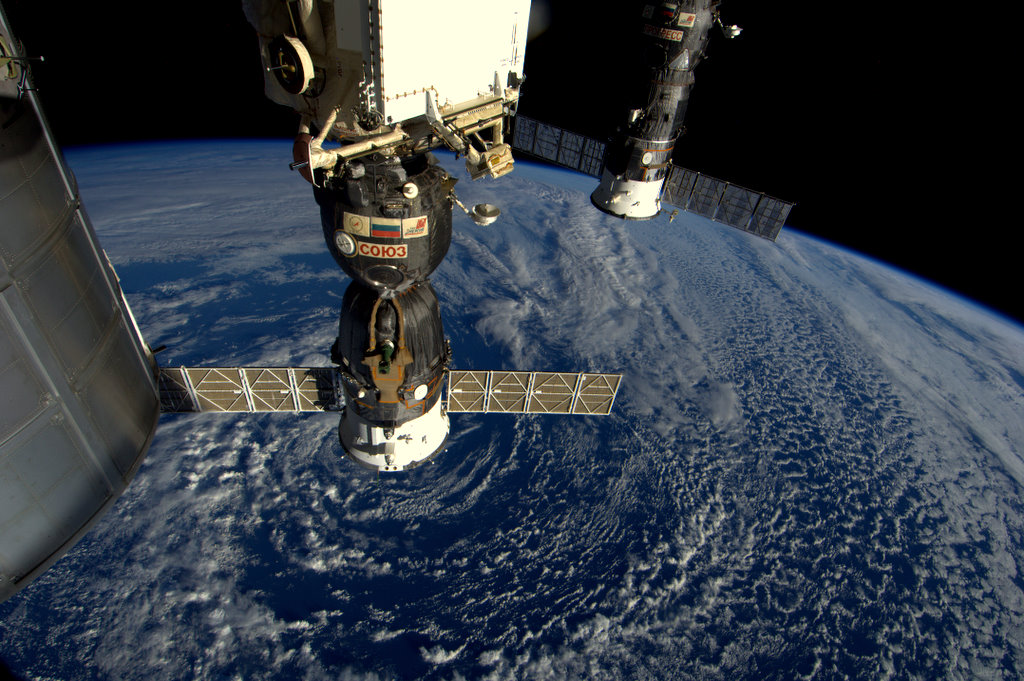For those following along with the flight of the Antares and Aquarius II experiments payloads, on Friday, November 16, 2012, 12:15 pm ET, Commander Sunita Williams conducted the final scheduled interactions with the SSEP payloads. Two experiments were activated, one shaken, and three de-activated. A complete catalog of all on-orbit interactions is found in the Experiments Log.
Commander Williams (NASA/USA), Flight Engineer Akihiko Hoshide (Japan Aerospace Exploration Agency), and Soyuz Commander Yuri Malenchenko (Russia) are scheduled to depart Station in Soyuz TMA-05M on November 18, 2012, at 5:26 pm ET. The SSEP Antares and Aquarius II experiments payloads will be aboard. Soyuz is scheduled to touch down in Kazakhstan at 8:53 pm ET. The payloads will then be flown back to Houston for distribution to all 23 student flight experiment teams across America for harvesting and analysis.
Farewells and hatch closure begin at 1:45 pm ET. You can watch live coverage on NASA TV right here, in the portal below. Also found below is NASA’s Press Release with details of the flight of Soyuz TMA-05M.
NASA TV
MEDIA ADVISORY: M12-215 NASA TELEVISION TO AIR SOYUZ LANDING COVERAGE NOV. 18 HOUSTON -- NASA Television will provide live coverage as three of the crew members on the International Space Station come back to Earth Sunday, Nov. 18. Expedition 33 Commander Sunita Williams of NASA, Flight Engineer Aki Hoshide of the Japan Aerospace Exploration Agency and Russian Soyuz Commander Yuri Malenchenko will undock their Soyuz TMA-05M spacecraft from the station, heading for a pre-dawn landing in Kazakhstan, northeast of the remote town of Arkalyk at 7:53 p.m. CST (7:53 a.m. Kazakhstan time on Nov. 19). Their return will wrap up 127 days in space since their launch from Kazakhstan on July 15, including 125 days spent aboard the station. At the time of undocking, Expedition 34 formally will begin aboard the station under the command of NASA's Kevin Ford. He and his crewmates, Russian cosmonauts Oleg Novitskiy and Evgeny Tarelkin, will tend to the station as a three-man crew for one month until the arrival of three new crew members in December. They are Tom Marshburn of NASA, Chris Hadfield of the Canadian Space Agency and Russian cosmonaut Roman Romanenko. NASA Television landing coverage will begin Saturday, Nov. 17, with the change of command ceremony when Williams will transfer the helm of the orbiting laboratory to Ford. Coverage will continue Nov. 18 and 19 with Expedition 33 landing and post-landing activities. (All Times Central) Saturday, Nov. 17: 1:15 p.m. -- Expedition 33/34 Change of Command Ceremony Sunday, Nov. 18: 12:45 p.m. -- Farewells and hatch closure (hatch closure scheduled at 1:10 p.m.) 4:00 p.m. -- Undocking (undocking scheduled at 4:26 p.m.) 6:30 p.m. -- Deorbit burn and landing (deorbit burn scheduled at 6:58 p.m.; landing scheduled at 7:53 p.m.) 9:00 p.m. -- Video File of hatch closure, undocking and landing activities Monday, Nov. 19: 9:00 a.m. -- Video File of post-landing activities and interviews For live streaming of NASA Television and program schedules, visit: http://www.nasa.gov/ntv For information on the International Space Station, visit: http://www.nasa.gov/station -end-
The Student Spaceflight Experiments Program (SSEP) is a program of the National Center for Earth and Space Science Education (NCESSE) in the U.S., and the Arthur C. Clarke Institute for Space Education internationally. It is enabled through a strategic partnership with NanoRacks LLC, working with NASA under a Space Act Agreement as part of the utilization of the International Space Station as a National Laboratory. SSEP is the first pre-college STEM education program that is both a U.S. national initiative and implemented as an on-orbit commercial space venture. The Center for the Advancement of Science in Space (CASIS) is a National Partner on SSEP.




